THERE’S the odd thing you would miss about watching county football with barely anyone else around. Landing at the ground 20 minutes before throw-in and dandering in at your leisure had its advantages, let’s be honest.
But the real gold you don’t get in the middle of a packed house is the occasional bit of slabbering on the field and the shouts from the sideline.
Perhaps forgetting himself at an empty Clones just as last year’s Ulster Championship finally got up and running, one Monaghan player could be heard telling a Fermanagh counterpart to “enjoy the Tailteann Cup” minutes before the long whistle blew on a one-sided victory for the Farney.
Likewise, anybody who got to cast their eyes – and their ears - over Derry during Covid times was sure of an unforgettable experience.
At Kingspan Breffni during the 2021 League, Rory Gallagher’s hoarsening voice echoed around the famous bowl from beginning to end.
There was a great moment in Ballybofey last summer too, during the first half of the Derry-Donegal clash which provides such an intriguing backdrop to Sunday’s Ulster final showdown between the north-west neighbours.
With only 500 spectators allowed inside MacCumhaill Park that July day, Gallagher and Ryan McHugh could be heard muttering at each other near the line beneath the stand.
Having been with Donegal when McHugh made his senior breakthrough years earlier, and then when Gallagher took up the reins in Kilcar, the pair are extremely well acquainted.
As a teenager, McHugh used to go for kickarounds with Gallagher during St Galls’ run to the 2010 All-Ireland club title. When Gallagher told him he was stepping down from the Tir Chonaill job, McHugh tried to talk him around.
Off the field and on it, the bond has always been tight.
Both wore half smiles as an increasingly heated conversation in Ballybofey recurred over a couple of minutes, all 500 patrons leaning their ears further forward - the typically animated Gallagher delivering constant instruction to his men, McHugh making sure he was close enough to hear every word, until eventually the nearest Derry player asked for a request to be repeated.
“Ah come on Rory,” shouted McHugh, quick as a flash, “will you tell this man what to do here.”
In the post-Covid era, and a return to normality, audiences are instead granted an all picture, no sound version of the Derry boss as he patrols the line with purpose – but it is no less dramatic. Just witness the celebrations at the end of the Ulster semi-final win over Monaghan.
As a consequence, much of the focus through the Oak Leaf campaign has centred on Gallagher, through the prism of his side’s performances. Several comment pieces have been written during the past month, not a podcast has passed without a lengthy discussion about what he brings to the table, while ex-players are queuing up to laud his genius.
In his Irish Independent column last weekend, Philly McMahon recalled coming up against Gallagher on the field when Ballymun faced St Brigid’s in the county championship.
What he witnessed that day left the former Dublin star unsurprised by the managerial success that has followed.
“Gallagher was as yappy on the pitch then as a player as he is hyperactive now on the line as a manager - I remember at one stage in the game he took a break to prophesise that we’d never win a championship while he was still playing football in Dublin.
“Gallagher was a smart footballer with a lot of ambition. He had a certain personality that marked him out as a potential manager, even back then. He was confident. The sort of confidence that doesn’t rub with opposition.
“But he was an obvious leader on a strong club team, even though he wasn’t from the club, or even the county. That takes a particular type of character.”
For Gallagher, the attention is nothing new. Well, not really.
In the early days of the Donegal revolution it was Jim McGuinness who commanded the column inches. Three years as McGuinness’s successor, and then two with his native Fermanagh, provided a different kind of education.
But football has always been at the heart of everything – not perception or the focus of the GAA public.
“Ah look, that’s nothing you get caught up in whatsoever.
“We know what our responsibility is in the lead-up to it and on game day, that doesn’t change. You have to be very mindful of the way it is going and what needs to be done. With Enda [Muldoon], Peter [Hughes] and Ciaran [Meenagh] you would have short discussions every so often, make as well analysed decisions as you can, and we feel we’re okay at doing that.
“We’re a new team to talk about and there will always be elements to talk about, that’s grand. But we just have to stay very centred on our preparations and what we need to do coming up to the Donegal game.”
Having already disposed of All-Ireland champions Tyrone and Monaghan, expectation has unsurprisingly cranked up at every turn. And while Derry’s renaissance was hardly a secret, increased scrutiny is an inevitable side-effect of success.
Those moments of glory, they are savoured in the immediate aftermath of victory, but not beyond. And while Derry supporters the length and breadth of the county couldn’t wait to relive a day for the ages, Gallagher had already moved on.
“I don’t watch The Sunday Game - I haven’t seen it in a long number of years.
“We play a different sport than soccer or basketball where there’s a game every three days or week on week… we play in a game where one defeat and it’s basically the end of the road. That’s a very different model to other sports.”
One thing he may have watched back since is last year's defeat to the men from Tir Chonaill, which came courtesy of a last-gasp score from Paddy McBrearty.
Speaking to The Irish News earlier this year, he was in no doubt about the lessons that simply had to be learnt.
“What it’s done reflecting on it [the Donegal game] is it has annoyed me. It’s annoyed our group of players, from speaking to them.
“There’s a lot of focus on Patrick [McBrearty]’s point and us not getting a shot away at the end, but we feel with seven or eight minutes to go, we should have had that game well out of sight."
And for the culture of togetherness and enjoyment that has been created away from the biggest days, humility remains the key as this Derry group bids to bury the memory of Ballybofey 10 months ago and add another chapter in their remarkable story thus far.
“It’s very, very clear - they know if they don’t stay grounded they’ll be let go. There’s a very simple prerogative from our point of view,” said Gallagher.
“When we met up on the Monday [after the Monaghan game], that was it, done and dusted. The boys were entitled to enjoy themselves on Sunday evening but the way it was, the day after the Tyrone game it was a Bank Holiday, but this time they were all at work on the Monday so you just get on with it again.
“It’s all or nothing to an extent, but it’s all a lifestyle choice as well - what do players want to do? They all are there because they love playing football, and have loved playing football from a young age, with their clubs and their schools.
“It’s just a very enjoyable place to be, and probably something they looked on from the outside, watching Tyrone, Donegal, Monaghan monopolise the Ulster Championship. Now they want to be part of that.”







